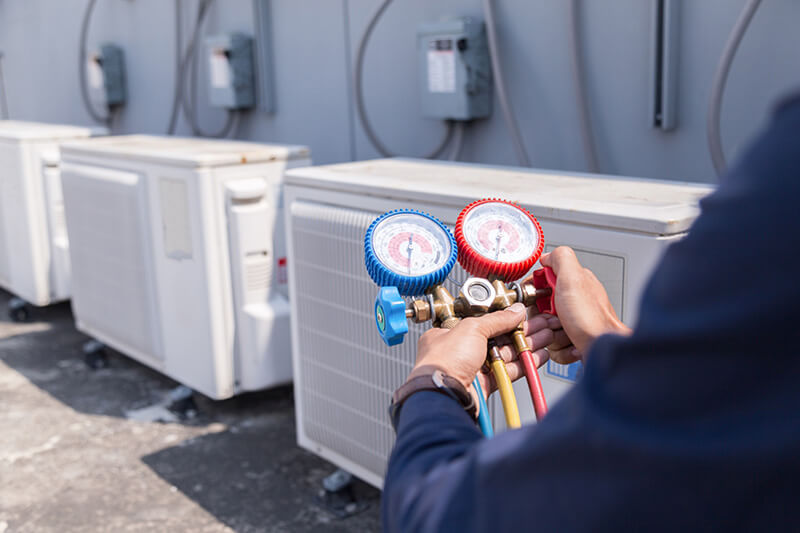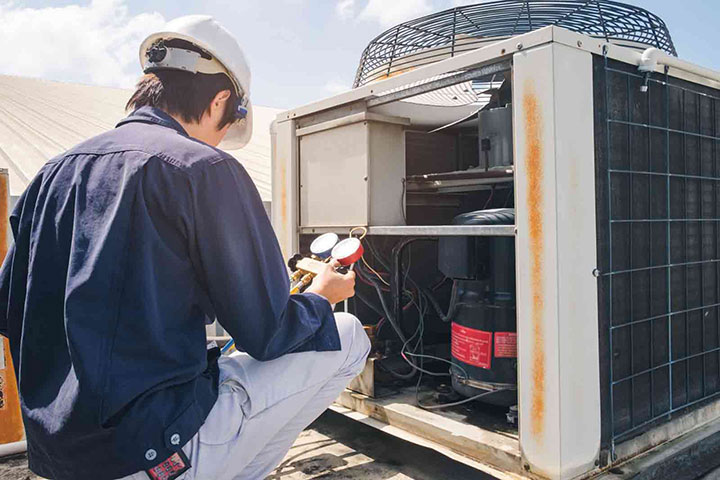Expert Tactics to Improve Indoor Air Quality with ductless mini splits
Expert Tactics to Improve Indoor Air Quality with ductless mini splits
Blog Article
Choosing In Between a Heat Pump and Heater: Key Considerations for Your HVAC Needs
When assessing heating choices for heating and cooling needs, the choice between a heatpump and a heater can be complex. Each system uses unique benefits customized to certain environments and energy effectiveness objectives. Comprehending these distinctions is vital for making an educated selection. Key aspects such as installation costs and ecological impact further complicate the choice process. Which alternative truly aligns with one's convenience and sustainability preferences? The adhering to sections will explore these considerations thoroughly.
Recognizing Warm Pumps: Just How They Work and Their Benefits
While many home owners consider various home heating choices, comprehending exactly how heatpump function and their benefits can significantly influence their choice. Heatpump operate by moving warmth instead of creating it. In the wintertime, they remove warmth from the outside air or ground and transfer it inside, while in the summertime, they reverse this procedure, cooling the home by removing warmth outside. This twin functionality makes them flexible for year-round climate control.One of the main advantages of heatpump is their energy efficiency. They use considerably less electrical power compared to typical heater, possibly causing reduced energy costs (heat pump replacement ooltewah tn). Additionally, heatpump have a smaller carbon impact, making them an eco pleasant choice. They additionally require much less maintenance than traditional systems, adding to long-lasting price financial savings. Overall, recognizing the auto mechanics and advantages of heatpump can aid property owners make educated choices concerning their home heating and cooling down requirements
Exploring Heating Systems: Types, Operation, and Benefits
Heating systems can be found in numerous types, including gas, electric, and oil designs, each with unique functional mechanisms. Comprehending these differences is vital, as they affect effectiveness and heating performance. Additionally, heaters offer many benefits, such as regular warm result and dependability in cooler environments.
Kinds of Furnaces
Heater can differ considerably in style and operation, with heating systems being a popular choice among home owners. There are a number of sorts of heating systems, each making use of various gas sources and innovations. Gas heating systems are usual, leveraging all-natural gas to create warmth efficiently. Electric heating systems, on the various other hand, make use of electric resistance to produce warmth, frequently preferred for their straightforward setup. Oil heating systems, while less common, are reliable in areas with restricted gas access (ductless mini splits). Furthermore, condensing heating systems optimize energy effectiveness by recycling and catching exhaust gases. Each kind operates via a system of warm exchangers and ductwork to disperse warm air throughout a home. Recognizing the differences in between these furnace types is necessary for informed HVAC choices
Benefits of Heaters
For home owners looking for reliable warmth throughout cool months, the benefits of heaters are substantial. Furnaces supply regular heating, making certain also temperature levels throughout the home. They are especially efficient in severe cool, typically outperforming heatpump in icy conditions. Different kinds, consisting of gas, electrical, and oil heaters, offer flexibility to satisfy diverse requirements and preferences.Furnaces likewise have a tendency to have reduced first installment prices contrasted to heatpump, making them an extra accessible option for numerous. Their robust design adds to a longer life-span, with many units lasting over 15 years with proper maintenance. Additionally, modern furnaces are frequently geared up with sophisticated innovation for enhanced performance, which can cause minimized energy bills. In general, furnaces continue to be a reputable selection for reliable home heating.

Power Efficiency: Comparing Warmth Pumps and Furnaces
When comparing energy performance between warm pumps and heaters, the Seasonal Energy Effectiveness Proportion (SEER) plays an essential function in establishing efficiency. Additionally, an operational expense evaluation discloses the long-term monetary ramifications of each system. Recognizing these elements can direct home owners in making educated choices about their heating options.
Seasonal Power Effectiveness Proportion
Power performance plays an essential role in the decision-making process between heat pumps and furnaces, particularly when thinking about the Seasonal Energy Effectiveness Proportion (SEER) This metric measures the cooling efficiency of heat pumps over a whole air conditioning period, giving a standardized way to evaluate performance. Greater SEER scores suggest higher energy efficiency, equating to reduced energy consumption and decreased utility costs. In comparison, heaters are generally assessed using the Yearly Fuel Usage Efficiency (AFUE) rating, which mirrors home heating effectiveness. When comparing these 2 systems, home owners must prioritize SEER ratings for heat pumps, as they straight effect overall power cost savings and environmental sustainability. A comprehensive understanding of SEER can notably affect the long-lasting complete satisfaction and cost-effectiveness of the chosen HVAC solution.
Operational Price Evaluation
Recognizing the functional costs linked with warmth pumps and furnaces is essential for house owners evaluating their options. Heatpump commonly offer greater energy performance, converting electrical energy right into heat with very little waste. This causes reduced month-to-month energy costs, specifically in modest environments. Conversely, typical heating systems, specifically gas models, might have lower ahead of time costs yet can incur higher functional expenditures in time as a result of fuel costs and efficiency ratings.Moreover, heatpump can operate as both heating and cooling systems, possibly lowering the need for separate HVAC systems. While preliminary financial investments for heat pumps may be greater, their long-term savings in power effectiveness can make them a more cost-effective option for several households. Cautious evaluation of neighborhood power prices is necessary to establish the best choice.
Installment Prices: What to Expect for every Heating Unit
Installment prices for home heating systems can differ considerably between warm pumps and heaters, affecting house owners' choices. Heatpump usually have higher upfront setup expenses, generally ranging from $3,500 to $8,000, relying on the unit size and complexity of setup. This includes the outside system, indoor handling system, and needed ductwork adjustments. On the other hand, heaters often tend to have lower preliminary prices, balancing in between $2,500 and $6,000, which can be appealing for budget-conscious property owners. Installment costs can boost if considerable ductwork is required.Moreover, the selection of gas type for furnaces-- all-natural gas, lp, or electric-- can additionally affect installation prices. While warmth pumps provide energy effectiveness, their initial financial investment might deter some customers. Eventually, examining installation prices together with lasting cost savings and performance will aid home owners in making educated choices regarding their furnace.
Climate Considerations: Which System Carries Out Much Better in Your Location
How do environment conditions affect the effectiveness of furnace? The efficiency of warm pumps and heaters can vary greatly depending upon the neighborhood climate. In modest climates, heatpump succeed by efficiently transferring warmth from the outside air, making them an energy-saving choice. Nonetheless, their efficiency reduces in extremely chilly temperature levels, where they may have a hard time to draw out enough heat. Conversely, heating systems, especially gas versions, give trustworthy and regular warm no matter outside problems, making them better in colder regions.In locations that experience milder winters, heatpump can run successfully year-round, giving both home heating and cooling. In comparison, regions with severe wintertimes usually benefit from the effectiveness of browse around this web-site heaters. Inevitably, understanding the local climate is essential when choosing between a heatpump and a furnace, as it straight influences their functional performance and general efficiency.
Maintenance Needs: Long-Term Take Care Of Heat Pumps vs. Furnaces
While both warmth pumps and heating systems require normal maintenance to assure peak performance, their specific demands and care regimens differ substantially. Heating systems generally require less constant attention, with yearly evaluations being sufficient to inspect for gas leaks, tidy filters, and assess total functionality. Their less complex style often permits simple repairs.In comparison, warmth pumps require biannual maintenance as a result of their double duty in heating and air conditioning. This consists of cleaning coils, examining refrigerant degrees, and ensuring that both the outdoor and indoor devices function at their finest. In addition, heatpump maintenance often includes even more intricate elements, making specialist maintenance essential.Neglecting maintenance can cause diminished effectiveness and raised energy costs for both systems. Eventually, home owners ought to think about these lasting treatment needs when choosing between a warm pump and a heating system, as positive upkeep can expand the life-span and efficiency of either system substantially.
Ecological Impact: Picking a Sustainable Heating Option
The ecological impact of furnace is a critical evaluation for home owners looking for lasting alternatives. Warmth pumps are generally much more energy-efficient than conventional heating systems, as they move warm as opposed to produce it, considerably minimizing carbon exhausts. By making use of eco-friendly power sources, such as geothermal or air-source heat pumps, property owners can even more reduce their ecological footprint.On the other hand, gas heating systems discharge greenhouse gases and add to air pollution, though they typically offer higher warmth outcome. Developments in innovation have led to the development of high-efficiency heaters that reduce emissions.Ultimately, picking a heating system includes evaluating performance versus ecological effect. Homeowners are urged to assess local power sources and rewards for sustainable systems, ensuring an option that aligns with both individual convenience and environmental duty. The decision influences not only prompt comfort however check my reference additionally long-lasting sustainability and ecological health.
Regularly Asked Questions
Exactly How Lengthy Do Heat Pumps and Furnaces Generally Last?
The lifespan of warm pumps typically varies from 15 to two decades, while heating systems can last in between 15 to 30 years. Routine upkeep substantially affects their durability and performance in providing heating options.
Can I Use a Warm Pump in Very Cold Climates?
Heatpump can operate in incredibly cool environments, but their effectiveness diminishes as temperature levels drop. In such problems, additional heating resources might be required to preserve comfy interior temperature levels and assure peak performance.

What Is the Noise Degree of Warm Pumps Versus Furnaces?
The noise degrees of heatpump and furnaces differ considerably. Generally, heatpump operate even more quietly than traditional heaters, making them better for those conscious appear, while heaters might generate louder functional sounds during home heating cycles.
Are Warm Pumps Suitable for Both Heating and Air conditioning?
Warm pumps are certainly ideal for both heating and air conditioning (heat pump replacement ooltewah tn). They work by moving warm, offering reliable temperature control year-round, making them a flexible choice for house owners seeking an all-in-one cooling and heating service
What Dimension Heating Unit Do I Need for My Home?
Figuring out the appropriate dimension heater for a home needs evaluating elements such as square video, insulation high quality, local environment, and the home's design. Consulting a specialist can ensure an accurate assessment and suitable convenience. Heat pumps normally offer higher energy effectiveness, converting electric power into warm with very little waste. In modest environments, warmth pumps excel by successfully moving heat from the outside air, making them an energy-saving option. On the other hand, heating systems, specifically gas versions, give regular and trusted warm no matter of exterior conditions, making them preferable in cooler regions.In locations that experience milder winter seasons, heat pumps can run effectively year-round, offering both heating and cooling. Heat pumps are generally you can check here more energy-efficient than traditional furnaces, as they move warmth instead than create it, greatly minimizing carbon exhausts. By using renewable energy sources, such as air-source or geothermal warmth pumps, homeowners can further decrease their eco-friendly footprint.On the various other hand, natural gas furnaces emit greenhouse gases and add to air contamination, though they typically offer higher warm outcome.
Report this page